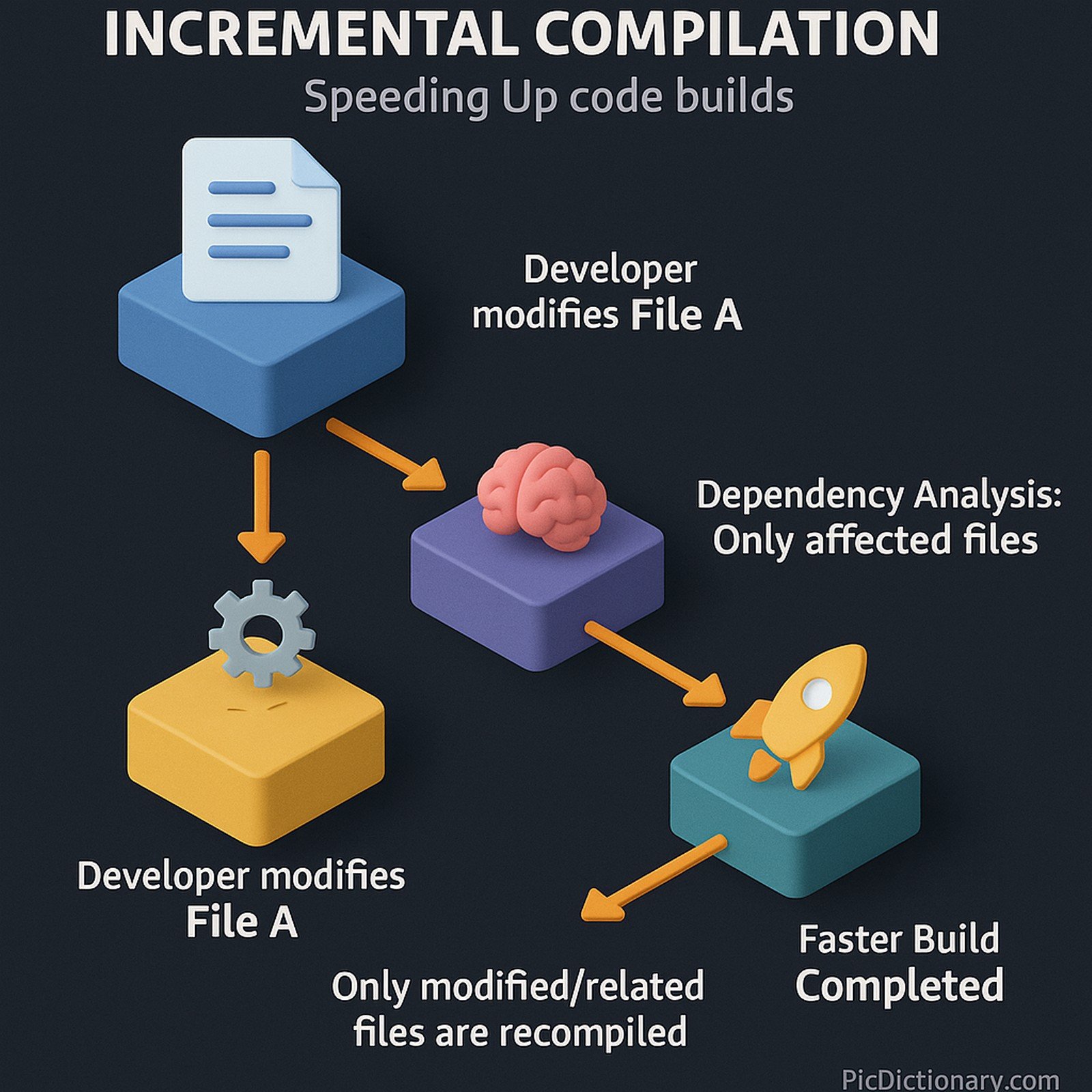Incremental Compilation

Quick Navigation:
- Incremental Compilation Definition
- Incremental Compilation Explained Easy
- Incremental Compilation Origin
- Incremental Compilation Etymology
- Incremental Compilation Usage Trends
- Incremental Compilation Usage
- Incremental Compilation Examples in Context
- Incremental Compilation FAQ
- Incremental Compilation Related Words
Incremental Compilation Definition
Incremental compilation is a process in software development where only the modified portions of code are recompiled instead of recompiling the entire codebase. This technique speeds up the development cycle, reducing build times and improving efficiency. Incremental compilation is widely used in modern Integrated Development Environments (IDEs) and build systems like Make, Gradle, and Bazel. By tracking dependencies and recompiling only affected files, it optimizes the compilation process, making software development more iterative and responsive.
Incremental Compilation Explained Easy
Imagine you are building a big LEGO castle, but then you decide to change only one tower. Instead of rebuilding the entire castle from scratch, you just replace that tower. Incremental compilation works the same way—it only updates the parts of a program that changed, making everything faster!
Incremental Compilation Origin
The concept of incremental compilation emerged alongside the development of large-scale software systems. As programs grew in complexity, developers sought ways to reduce compilation times. Early implementations appeared in the 1970s and 1980s with tools like Make, which introduced dependency tracking to avoid unnecessary recompilation.
Incremental Compilation Etymology
The term “incremental” comes from the Latin word incrementum, meaning “growth” or “addition.” It signifies a gradual or step-by-step process. In computing, “compilation” refers to converting human-readable code into machine-executable instructions.
Incremental Compilation Usage Trends
Incremental compilation has become increasingly important with the rise of modern, large-scale applications. Development environments for Java, C++, Rust, and JavaScript frameworks like React utilize incremental compilation to speed up development workflows. The increasing reliance on continuous integration and rapid iteration cycles has further driven its adoption.
Incremental Compilation Usage
- Formal/Technical Tagging:
- Software Development
- Build Optimization
- Compiler Design - Typical Collocations:
- "incremental compilation process"
- "compiler with incremental support"
- "reducing build time through incremental compilation"
- "efficient recompilation strategy"
Incremental Compilation Examples in Context
- Modern IDEs like IntelliJ IDEA use incremental compilation to recompile only the changed parts of a Java project.
- The Rust compiler (rustc) supports incremental compilation to make builds faster, especially in large projects.
- Webpack, a popular JavaScript bundler, applies incremental builds to optimize page load times in web development.
Incremental Compilation FAQ
- What is incremental compilation?
Incremental compilation is a process where only modified code sections are recompiled, rather than the entire program. - Why is incremental compilation important?
It speeds up the development process by reducing unnecessary recompilation, improving efficiency. - Which programming languages support incremental compilation?
Many languages, including Java, C++, Rust, and JavaScript, benefit from incremental compilation in their respective build tools. - How does incremental compilation work?
It tracks dependencies and recompiles only the files affected by code changes. - What are some common tools that use incremental compilation?
Make, Gradle, Bazel, Webpack, and rustc all support incremental compilation. - Does incremental compilation affect runtime performance?
No, it only affects build times and does not impact the program’s execution speed. - Can incremental compilation fail?
Yes, incorrect dependency tracking or build system errors can cause issues requiring a full recompilation. - Is incremental compilation useful for small projects?
It’s more beneficial for large projects but can also help small projects with frequent code changes. - How does incremental compilation relate to continuous integration?
It helps CI/CD pipelines by reducing build times and making the process more efficient. - Does incremental compilation work with interpreted languages?
No, it mainly applies to compiled languages, but some interpreters use similar caching strategies.

Incremental Compilation Related Words
- Categories/Topics:
- Software Engineering
- Compiler Theory
- Build Systems
Did you know?
One of the earliest uses of incremental compilation was in Unix's make tool, introduced in 1977. It revolutionized software development by allowing developers to recompile only necessary parts of a project, laying the groundwork for modern build systems like Gradle and Bazel.
PicDictionary.com is an online dictionary in pictures. If you have questions or suggestions, please reach out to us on WhatsApp or Twitter.Authors | Arjun Vishnu | @ArjunAndVishnu

I am Vishnu. I like AI, Linux, Single Board Computers, and Cloud Computing. I create the web & video content, and I also write for popular websites.
My younger brother, Arjun handles image & video editing. Together, we run a YouTube Channel that's focused on reviewing gadgets and explaining technology.



Comments powered by CComment